Innovation in Action: NEU Achieves Historic Success at TEKNOFEST 2025

Representing both Northern Cyprus and innovation-driven education, Near East University competed in the finals with five campus-developed projects and emerged as the only university from Northern Cyprus to reach the podium—twice. Near East University became the only university at TEKNOFEST 2025 to win two championship titles, underlining the university’s growing impact in research and applied science.
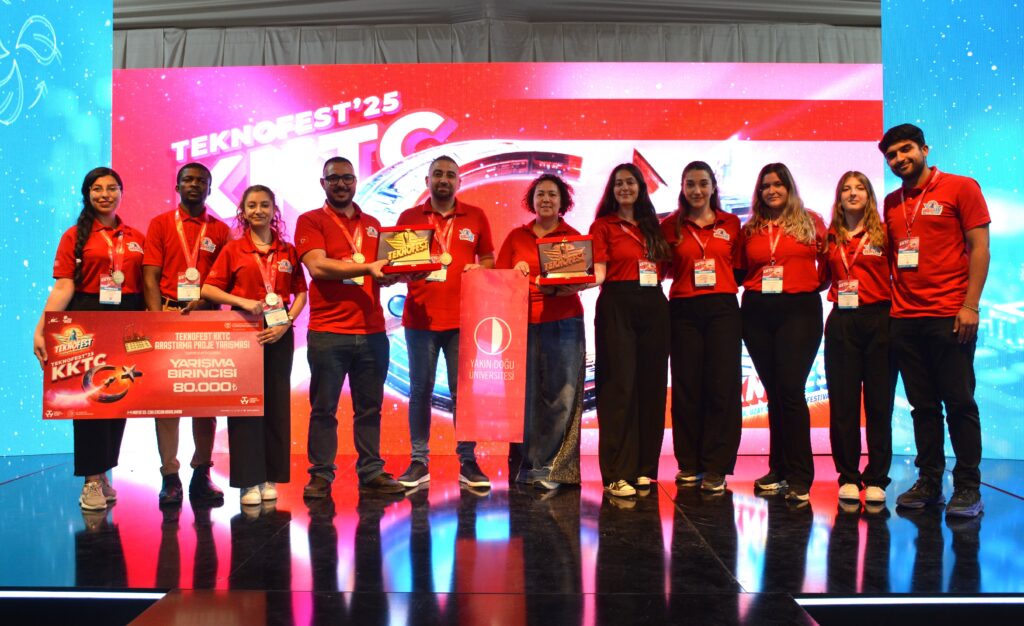
Heavy Metal: Smart Sensors for Safer Agriculture
Heavy Metal team, under the supervision of Assoc. Prof. Dr. Süleyman Aşır, under the team captainship of Mehmet Karagözlü and team members Valarie Oru Agbor, Fulya Yonucu and Benaz Shirgir, won the TEKNOFEST2025 Northern Cyprus Research Project Competition in first place.
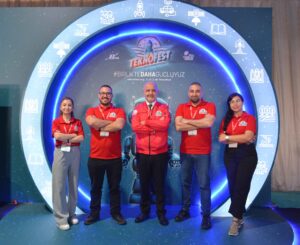
The winning project addresses food security and environmental sustainability through a portable heavy metal detection system based on electrochemical principles. The system enables real-time, on-site monitoring of toxic elements like lead in soil and water—providing farmers and agricultural experts with immediate feedback to guide safer and more efficient farming practices. By integrating this smart sensor technology into precision agriculture, the project aims to significantly enhance crop productivity and environmental protection.
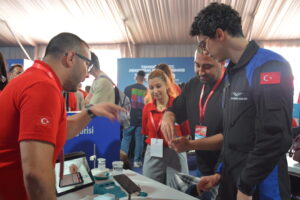
Heavy metals such as lead (Pb), cadmium (Cd), arsenic (As) and mercury (Hg) can be extremely dangerous for human health when found in food and water. Recent studies have shown that even low levels of Pb exposure can cause adverse health effects, especially in children. Heavy metals are released into soil, water and air in significant amounts through transportation, industrial and agricultural activities and other anthropogenic activities. As a result, environmental heavy metal concentrations are increasing sharply and have an impact on both human health and the ecological balance.
Traditional techniques, such as atomic absorption spectroscopy (AAS), inductively coupled plasma mass spectroscopy (ICP-MS), and inductively coupled plasma optical emission spectroscopy (ICP-OES), have been used for determining heavy metals. However, although these techniques are highly selective and sensitive, they have several difficulties, including high costs, long detection times, complex operational procedures, the challenge of detecting heavy metals in real-world environments, and the need for trained personnel. To overcome these disadvantages, electrochemical methods (ECMs) have been widely accepted in heavy metal determination in many recent studies. These ECMs can provide the same sensitivity with shorter detection times, lower costs, and less complex operational procedures.
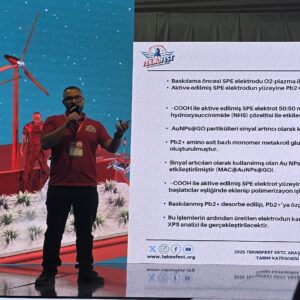
Optimization and analytical performance of the sensor are achieved through the Differential Pulse Voltammetry (DPV) method. Various MIP sensors are evaluated with different monomer-to-target ratios to determine which ratio yields the most suitable and exhibits the best performance. The produced MIP-SPE is compared to non-imprinted polymers (NIP-SPE) for the imprinting efficiency study, yielding an imprinting factor of 2.43. Furthermore, the selectivity of the developed sensor is tested against competitor ions such as cadmium (Cd) and copper (Cu), demonstrating that the sensor exhibits a selectivity factor that is 7.63 times greater for Cd and 16.6 times greater for Cu. In conclusion, the project aims to provide rapid, cost-effective heavy metal analysis on-site for agricultural experts, farmers, and scientists conducting research on heavy metals, thereby contributing to safer agricultural practices and better environmental stewardship.
EcOceanX: Recycling Marine Waste into Renewable Solutions
In the Environment and Energy Category, NEU’s EcOceanX team received the “Best Presentation Award”, one of the Prestige Awards in the TEKNOFEST-Northern Cyprus Research Project Competition.
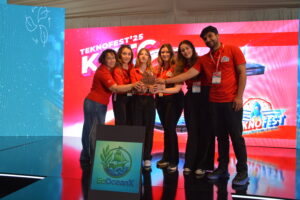
The EcOceanX team was founded by a group of students from the Department of Molecular Biology and Genetics—Melin Nisa Kılınç, Zelal Yağmur Tabak, Nur Selin Süzer, Kerem Aydoğdu, and Nalin Dora—under the supervision of Asst. Prof. Dr. Selin Deliceırmak.
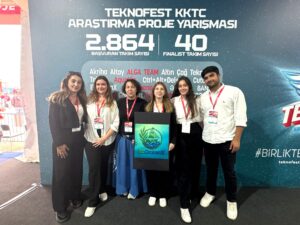
Their project explores the critical intersection between marine conservation, blue biotechnology, and sustainable technological innovation. It proposes an integrated system designed to systematically collect marine debris—particularly organic pollutants—from coastal and nearshore environments. These materials are then processed using eco-friendly technologies and transformed into upcycled raw materials suitable for industrial reuse.
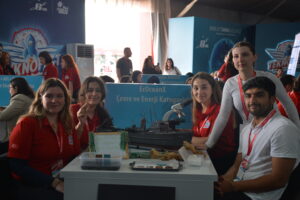
A key innovation of the project is the development of a next-generation, biodegradable marine coating derived from recycled marine biomass, such as dead leaves of Posidonia oceanica. This coating serves as an antifouling layer for ship hulls and maritime infrastructure, aiming to reduce biofouling, lower fuel consumption, and eliminate the need for toxic biocides—ultimately mitigating pollution in marine ecosystems.
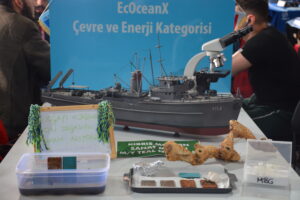
Beyond technological advancement, the project embraces circular economy principles and supports coastal ecosystem resilience by promoting debris-to-resource pathways. With its multidisciplinary approach—spanning marine ecology and blue biotechnology—EcOceanX contributes to both marine biodiversity protection and the sustainable use of natural resources.
The team is now preparing to upscale their innovation through a research project funded by the Near East University Scientific Research Projects (BAP) program.
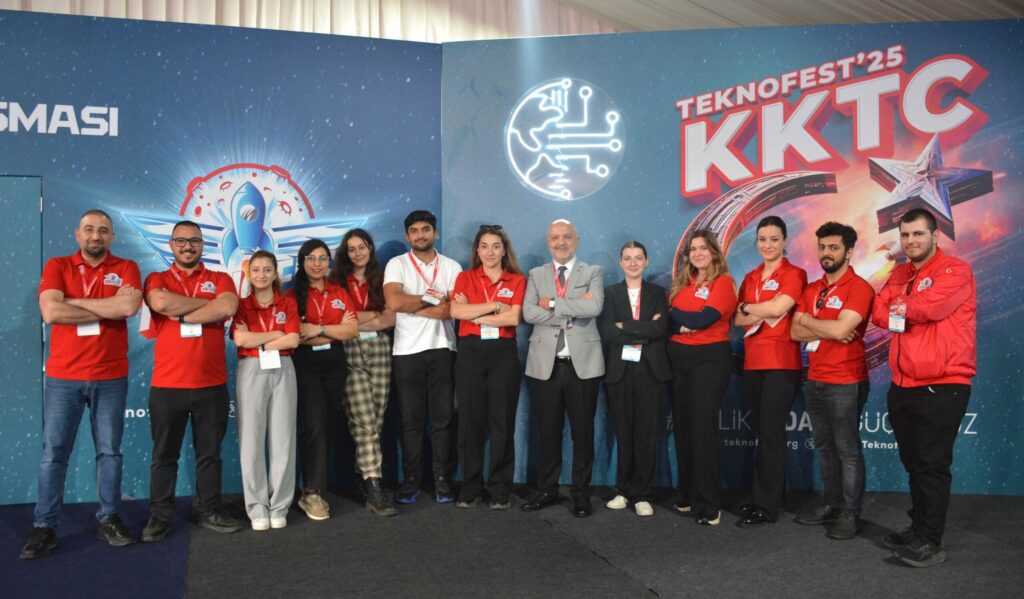
These achievements demonstrate Near East University’s dedication to combining sustainability, innovation, and interdisciplinary research with practical impact. Success at a highly competitive and prestigious platform like TEKNOFEST highlights the technical expertise of NEU students and faculty, while underscoring the university’s strong position in driving scientific and technological progress for the benefit of society.